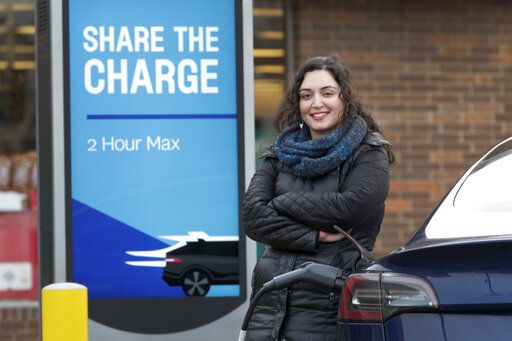Nearly three quarters of auto dealers nationwide currently are not selling electric vehicles.
They don’t even have one EV to sell. Forty percent of dealers have no more than two on the lot.
When secret shoppers visited dealerships, at two thirds of locations sales people provided no information on how to charge EVs or about federal or state tax incentives.
These were the findings of the Sierra Club, who had volunteers visit dealerships around the country to conduct the research.
If dealers want to survive in a world that is quickly embracing the benefits of EVs, this all needs to change, says Chicago resident Neda Deylami. “We are entering a new automotive landscape where the electrification of transportation is going to become commonplace,” says Deylami, who a couple of years ago founded an EV advocacy group called Chicago Electric Vehicles.
As a part of the EV group, Deylami helped to hold EV education events in various Chicago communities. She also worked with Chicago Area Clean Cities to host consumer EV ride-and-drives as a part of the American Lung Association’s Midwest EVOLVE project at the Chicago Auto Show. Over two years, the coalition gave plug-in vehicle test drives to nearly 2,000 people.
She says climate change, air pollution and the success of Tesla has changed the game. “As more and more consumers get behind the wheel of electric vehicles, they find out that they love them. They love how quiet they are, their performance, that they are much less expensive to operate, and that they don’t pollute.
“These consumers are demanding dealers change,” she says. “It is time for dealers to learn the advantages of EVs and how to sell them.”
Through a fellowship from the organization E2 (Environmental Entrepreneurs), Deylami is setting out to educate dealers throughout the Chicago area about electric vehicles.
Deylami has developed a training and curriculum that she’ll use to train dealers. She will be training dealers on the ins and outs of EVs, their advantages over gas-powered vehicles, how to market them and encourage consumers to get behind the wheel.
“For 100 years, dealers have been selling vehicles with internal combustion engines,” Deylami says. “EVs are new technology; sales people need to be trained on them.
“Your customers want to know: How can I charge at home? How can I charge on the go? What does that look like for me? Are there incentives? Tax credits? Do I qualify? Does the model that I am buying qualify? Are there rebates? This is all crucial information for consumers to know if they want to buy an EV,” she says.
“Yes, auto dealers lack adequate training,” said Micaela Preskill, Midwest advocate for E2, in an interview with Energy News Network last spring. “They also are less incentivized to sell EVs. Car dealerships make money off service, and EVs don’t require as much service. With an EV there is no transmission, no spark plugs, no oil changes. Dealerships should be better educated about EVs so they are able to present the pros and cons and arm consumers with the information they need to make the right choice. EVs have many benefits to consumers including reduced fuel costs, federal tax credits and higher performance.”
Sales strategies to sell electric versus gasoline-powered cars also may be different, Deylami says. “It’s not business as usual. Consumers want you to be informed about the products, the technology and how to charge them. Most people do a lot of research before they go into a dealership. They shouldn’t know more than the sales person.”
Deylami says her goal is to be ongoing support to sales people, and at the same time be able to provide the environmental community and EV drivers with a vouched-for list of dealers, “so you don’t have to worry about getting misinformation,” she says.
“Dealers see that they need to be in front of this,” Deylami added. “It is important to train and invest in your people. If you don’t, you’ll be left behind. Customers will go to another dealer who has trained their people. It’s important to do this now or risk losing customers.”
About Neda
Deylami works with the Electrification Coalition as a Transportation Electrification Field Organizer. Prior to joining EC, Neda co-founded Chicago for Electric Vehicles, Chicagoland’s first EV owners group focused on grassroots advocacy, which advanced policy to expand access to EVs for low-income, black and brown, urban, and renting communities. She was a 2020 E2 1 Hotels Fellow for her work developing an EV training program for dealers. She has worked on statewide and local policy campaigns on environmental and fiscal issues. Neda holds a bachelor’s degree in International Studies from DePaul University, a law degree from Loyola University Chicago School of Law, and is licensed to practice law in Illinois.



